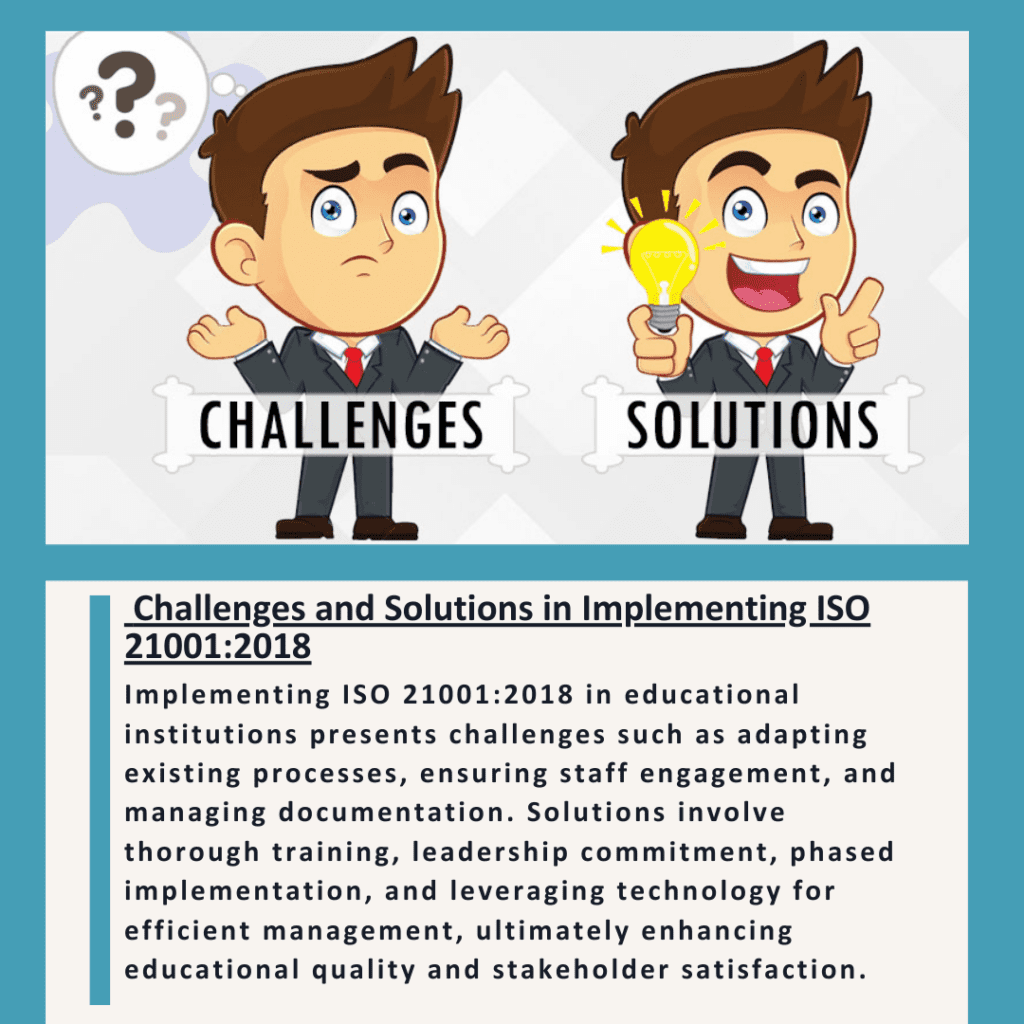Subtotal $0.00

Implementing ISO 21001:2018, the standard for Educational Organizations Management Systems (EOMS), presents both challenges and opportunities for educational institutions seeking to enhance their operational efficiency and improve educational outcomes. This comprehensive framework focuses on meeting the specific needs of learners and other stakeholders while maintaining a systematic approach to quality management. Below, we explore the common obstacles faced during implementation and practical solutions to overcome them.
Challenges in Implementing ISO 21001:2018
Understanding and Interpretation of Requirements: Educational institutions often struggle with interpreting the requirements of ISO 21001:2018 due to its specific focus on educational processes and outcomes. The language of the standard may require adaptation to fit within the context of different types of educational institutions.
Resource Allocation: Allocating sufficient resources, both financial and human, is a significant challenge. Implementing ISO 21001:2018 requires investments in training, technology, and infrastructure to meet compliance and effectively manage educational processes.
Resistance to Change: Resistance from staff, faculty, and administrators can hinder the adoption of new processes and practices mandated by ISO 21001:2018. Fear of increased workload, changes in responsibilities, or perceived threats to autonomy may contribute to resistance.
Integration with Existing Systems: Many educational institutions already have established quality management systems or educational management software. Integrating ISO 21001:2018 requirements with these existing systems without disrupting ongoing operations poses a challenge.
Documentation and Record-Keeping: The standard requires rigorous documentation of processes, procedures, and performance indicators. Educational institutions may struggle with creating and maintaining comprehensive documentation systems that align with ISO 21001:2018 requirements.
Stakeholder Engagement and Communication: Engaging and communicating with stakeholders, including students, parents, faculty, and administrative staff, about the purpose and benefits of ISO 21001:2018 can be challenging. Ensuring their buy-in and active participation in the implementation process is crucial for success.
Solutions to Overcome Challenges
Comprehensive Training and Education: Provide comprehensive training sessions and educational programs to ensure that all stakeholders understand the requirements and benefits of ISO 21001:2018. Tailor training sessions to different levels of the organization, from senior management to frontline staff, to foster a culture of understanding and commitment.
Strategic Resource Planning: Develop a strategic resource plan that outlines the financial, human, and technological resources required for successful implementation. Allocate resources based on priority areas identified through a thorough gap analysis against ISO 21001:2018 requirements.
Change Management Strategies: Implement effective change management strategies that address concerns and resistance to change among staff and stakeholders. Clearly communicate the reasons behind implementing ISO 21001:2018, highlight potential benefits such as improved educational outcomes and stakeholder satisfaction, and involve key stakeholders in decision-making processes.
Gradual Integration and Phased Implementation: Adopt a phased approach to integration with existing systems and processes. Begin with pilot projects or departments to test implementation strategies and gather feedback before scaling up across the entire institution. This approach minimizes disruption and allows for adjustments based on lessons learned.
Document Management Systems: Implement robust document management systems that facilitate easy creation, storage, retrieval, and updating of documentation required by ISO 21001:2018. Utilize digital platforms and software solutions that support version control, accessibility, and security of documents.
Stakeholder Engagement and Communication Plans: Develop comprehensive stakeholder engagement and communication plans that outline key messages, communication channels, and timelines for engaging with stakeholders throughout the implementation process. Solicit feedback, address concerns, and celebrate milestones to maintain momentum and support.
Case Studies and Best Practices
Case Study 1: University X University X successfully implemented ISO 21001:2018 by establishing a dedicated implementation team comprising representatives from across departments. They conducted regular training sessions, utilized a phased approach for integration, and implemented a digital document management system. As a result, they saw improved student satisfaction and efficiency in administrative processes.
Best Practice: Continuous Improvement Emphasize continuous improvement as a core principle of ISO 21001:2018. Encourage regular review and evaluation of processes, performance indicators, and stakeholder feedback to identify areas for enhancement. Implement corrective and preventive actions to address non-conformities and ensure ongoing compliance with the standard.
Conclusion
Implementing ISO 21001:2018 presents educational institutions with an opportunity to enhance their quality management systems and ultimately improve educational outcomes. By addressing common challenges through strategic planning, comprehensive training, effective communication, and stakeholder engagement, institutions can successfully navigate the complexities of implementation. Continuous improvement and a commitment to meeting the needs of learners and stakeholders are key to achieving and maintaining ISO 21001:2018 certification.